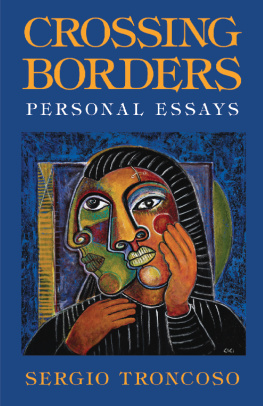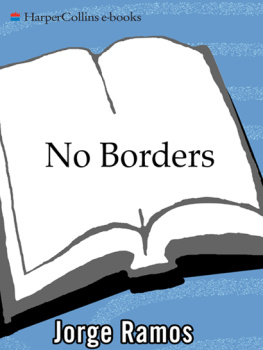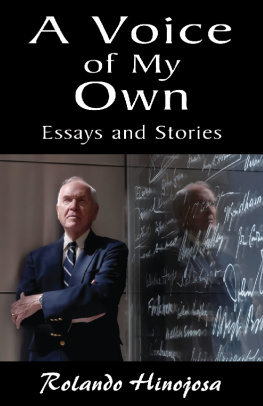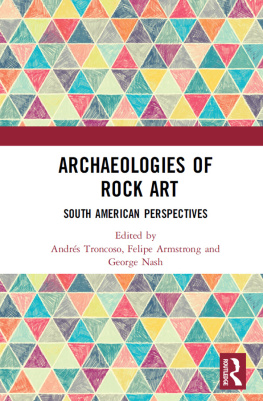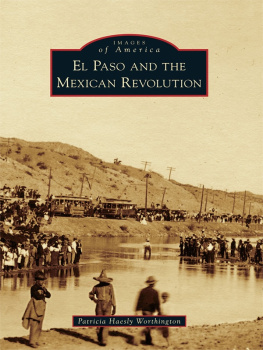
Advance praise for Crossing Borders:
Sergio Troncoso takes us on his journey from El Paso to New York, from child to husband, and student to father. He describes the solitary struggle of the writer, and the social and political hurdles overcome. Troncoso understands that in emerging from his chrysalis, he can never go backnor does he want to. But the lesson is clear: You give something up to gain something else. As they say in the mercado in Chihuahua, What will you take for it? Troncoso paid quite a lot, and it is worth our while to witness this journey from native son to the bloody birth of a public intellectual. Kathleen Alcal, author of The Desert Remembers My Name
Border-crossings is a metaphor for the experience of Hispanic-American professionals traversing Americas borders on their way to making a better life for self, family and country. Troncosos use of short stories, as if entries in a personal diary, captures important life-impacting times along his journey from the barrio through elite higher education to a life as a caring father and husband even while continuing to navigate the nearly always invisible barriers of exclusion. Readers interested in modern day acculturation will want to read and reflect on this rare opportunity to crawl into the mind of a talented, Latino author who writes about a common Latino professionals story, and draw from his openness lessons intended to make us all better people. Frank Alvarez, President and CEO of the Hispanic Scholarship Fund
Praise for the work of Sergio Troncoso:
Typical themes of love, death, coming-of-age and family life drive the narratives, but the El Paso setting lends them cultural depth. A series of tales about older men and women explores their vulnerability, loneliness and faith in God as they near death, while other stories concentrate on young adults caught in the cultural gap between their Mexican heritage and American lives. These stories are richly satisfying. Publishers Weekly on The Last Tortillas and Other Stories
Single handedly redefines the Chicano novel and the literary thriller. The El Paso Times on The Nature of Truth
Letter to my Young Sons: Part Two
Lauras day for surgery had arrived, Monday, April th. Laura had been instructed to be at the hospital, across Central Park at York Avenue and 67th Street, at 7 a.m. We left our apartment on the Upper Westside when Broadway was still dark, the street empty. Our Guatemalan babysitter, Amparo Saenz, had commuted from Jamaica, Queens at an even earlier hour, to take care of Aaron and Isaac on this emotional, eventful day. Since this Monday was not a school day for Aaron, Amparo did not have the extra duty of taking both children on the bus to Bank Street.
As we drove in the taxi through the murky streets, Laura did not say anything until we entered the canyon of glittery mica walls under a canopy of trees in Central Park. Im a little scared, she whispered. I told her I would be in the hospital all day, until she exited surgery and the anesthesia recovery room. Later that day, her parents would be flying into New York from Boston. Laura and I knew this day would be the beginning of our fight against her breast cancer, and we were relieved the day had arrived. It had been dreadful to wait for appointments, and wait for test results, and wait again for Lauras date with surgery. We were not in control of our destiny. With every delay, we imagined we allowed Lauras cancer to act against her body until it might gain an insurmountable, deadly advantage. This day, April 13th, would be the longest day of my life.
At Memorial, we walked into the business office first, as we had been instructed. We filled out papers detailing our medical insurance, who would be responsible for bills not covered by insurance, home addresses, drivers license numbers. We were handed more papers and given directions where to report inside Memorial. Laura and I next sat in a white room, with beds on wheels, where nurses began to prep Laura for surgery. Doctors, or their assistants, would march into the room, ask Laura a few questions, obtain written authorizations for what they were about to do and leave. Dr. Hidalgo arrived and began to mark Lauras chest and abdomen with what looked like a Magic Marker: the location of his incisions, where he wanted the breast surgeon to conserve skin, the exact position of her ribs before the TRAM flap and the rearrangement of muscle and fat for the breast reconstruction. In a few moments, I thought, Laura had metamorphosed from a worldly New Yorker on Broadway, to a patient at a hospital, to a billing number, to a body, and these transformations occurred as if we were watching someone else on the silver screen.
Dr. Hidalgo had a soft, focused demeanor. I could barely hear him whenever he spoke, yet I had the sense he possessed great knowledge about his work. When Laura and I had waited in Hidalgos Upper Eastside office, I had marveled at the oil paintings of yellow roses and white lilies by the doctors hand: he was a man obsessed with the exquisite details of beauty. Dr. Borgen, the breast surgeon, had also been attentive and careful, but he was a general ready to command his soldiers through the most difficult terrain. Borgen was direct and forceful. His mind and his hands acted in concert. Whatever was in his mind was translated immediately to movement and action.
Lauras surgery would have three parts. Borgen would perform the mastectomy on her right breast, and preserve much of the skin. He would also remove lymph nodes from under Lauras right arm to test them for cancer. If the lymph nodes tested positive, then the cancer had most likely spread beyond Lauras breast. Any discovery of the cancers metastasis dramatically lessened Lauras chances for survival. After Borgen completed his work, Barakat and Hidalgo would work together. Hidalgo would make incisions in Lauras abdomen for the tissue that would be shifted to her reconstructed breast. Barakat, the gynecologist, would proceed further from these incisions and remove her ovaries. Borgen and Barakat would need about an hour each to finish their procedures, and Hidalgo would require six hours to reconstruct the breast.
One doctor after another. Good doctors. Maybe great doctors. But each performing major surgery on Laura. I knew she was brave. I prayed each procedure would unfold smoothly. I prayed the immense strain of this marathon surgery would not overwhelm Laura. I prayed the doctors would find nothing new. From experience, I knew that whatever the doctors could find with tests and X-rays could be vastly different from what they might discover with their eyes and hands. I did not want to cry, but I knew we faced many dangers on this fateful day. We needed effort and luck. We needed hope on our side.
A nurse marched into the prep room and said it was time to go. I accompanied Laura, who was strapped onto a stretcher, to the pre-operating room, where after a few minutes I would have to say goodbye. I carried a blue duffel bag with Lauras clothes: her jeans, blue cotton oxford shirt, which reminded me of El Paso, her bra, sneakers, white socks, earrings, Swatch, Hawaiian robe (a memento from our honeymoon) and blue slippers. As I followed the two attendants wheeling Laura down the hallway and into a huge elevator, my heart throbbed, but I smiled and rubbed her smooth, pale forehead. I would stay at Memorial, I repeated, until her surgery was over. I would not leave the hospital until I saw her again.
We arrived in the pre-op room with four stretchers with patients already waiting in between sky-blue curtains. As soon as Laura was settled into her spot and the pre-op nurse walked away, I kissed Laura and rubbed her cheek. I wanted to present a brave face to her, to give her all the nimo I could muster, but inside I was terrified. I did not want this to be the last time I saw Laura. For a few seconds, she cried softly, her big blue eyes swimming in tears, and I reassured her she had excellent doctors who would take care of her. She told me one of her greatest fears was not having her glasses. Whenever Laura takes out her contact lenses, she wears thick Mr. Magoo glasses. The last time at Memorial, for the ovarian cyst she had removed years ago, Laura had handed her glasses to a nurse who had difficulty locating them after the operation. On this day, the pre-op nurse again informed Laura she could not wear her glasses in the operating room. Before I left I took them with me. As soon as the doctors allowed me to visit her in the post-anesthesia recovery room, I would bring Laura her eyes.
Next page
